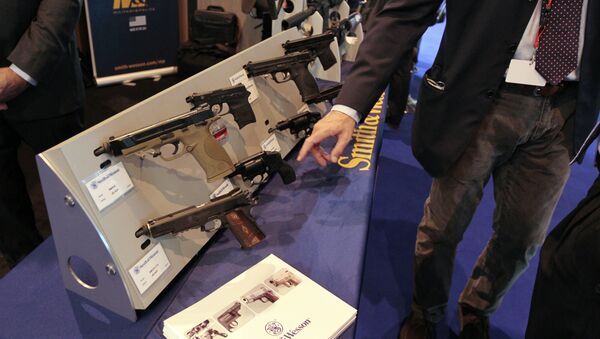The European Parliament has adopted a report critical of EU arms manufacturers for supplying equipment to oppressive regimes, fueling global conflicts. The report says that the European Parliament is "deeply concerned at the spread of armed conflicts, notably those in Ukraine, Syria, Iraq, Libya and Yemen as well as all international conflicts, which, in an increasingly globalized world, are a threat to world stability and security."
According to the EU code of conduct on arms export: "Member States will not issue an export license if there is a clear risk that the intended recipient would use the proposed export aggressively against another country or to assert by force a territorial claim."
Wrong Hands
However, according to a recent report from Amnesty International, weapons being used by Daesh, also known as ISIL, in Iraq and Syria may have fallen into their hands via a complex web of arms deals involving the UK, the US and other western nations.
Iraq: ‘Islamic State’ atrocities fuelled by decades of reckless arms trading https://t.co/kNvb6paKuo #ArmsTreaty pic.twitter.com/Md7C5wV687
— AmnestyInternational (@AmnestyOnline) December 8, 2015
The report said the vast majority of weaponry used by Daesh was taken from stocks previously owned by the Iraqi army, much of which was supplied from western sources.
"The UK was involved in supplying the Iraqi security services. In early 2007, China shipped approximately 20,000 assault weapons to the UK for onwards shipment to the Iraqi security services. Similarly, between March 2005 and December 2006, a variety of small arms and light weapons were exported from Bosnia and Herzegovina and Serbia to the UK, and then re-exported to Iraq. As a result of systematic failures at all points of the US-led coalition distribution process in Iraq, hundreds of thousands of weapons transferred by the US and other members of the coalition want astray," the report found.
Bodil Valero, who is the European Parliament's rapporteur for the report, said:
"The European Parliament has sent a clear signal to EU governments on the need to tighten up EU rules and practices on arms exports. The existing rules are binding but a major problem is that these rules are not properly implemented, with the consequence that arms still end up in the wrong hands. The report highlights the need to ensure better implementation but also calls for stricter EU rules."
It's time to crack down on arms exports to those who don't respect human rights @bodilvalero https://t.co/DknYdN3oSP pic.twitter.com/2Ufjozm2ui
— EU Reporter (@eureporter) December 17, 2015
1st fall since 2010, €36.7bn arms exports licensed by Member States 2013 https://t.co/WswhaqHSml @bodilvalero #MEPs pic.twitter.com/be26u91Sct
— EP Research Service (@EP_ThinkTank) December 16, 2015
"European arms continue to end up in the hands of repressive regimes, terrorists and criminals, fueling the conflicts in those countries. EU arms exports are not only a threat to the citizens of recipient countries and their neighboring states, but also in Europe: arms exported to conflict zones later make it back to the black market in Europe and into the hands of criminals and terrorists," he said.



